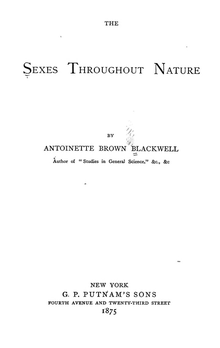 Title page of The Sexes Throughout Nature | |
| Author | Antoinette Brown Blackwell |
|---|---|
| Publisher | G. P. Putnam's Sons |
Publication date | 1875 |
The Sexes Throughout Nature is a book written by Antoinette Brown Blackwell, published by G. P. Putnam's Sons in 1875.
 Title page of The Sexes Throughout Nature | |
| Author | Antoinette Brown Blackwell |
|---|---|
| Publisher | G. P. Putnam's Sons |
Publication date | 1875 |
The Sexes Throughout Nature is a book written by Antoinette Brown Blackwell, published by G. P. Putnam's Sons in 1875.
The book critiques Charles Darwin four years after he published The Descent of Man, and Selection in Relation to Sex in 1871, [1] and Herbert Spencer, whom the author thought were the most influential men of her day. [2] Darwin had written a letter to her in 1869, thanking her for a copy of her book, Studies in General Science. [3] She also answers Dr. E. H. Clarke and his book Sex and Education which she deplored. [4] Blackwell's book was republished by Hyperion Press in 1976, 1985 and 1992. [5] Parts of the book were first published in Woman's Journal and Popular Science Monthly . [6]
Blackwell chose to highlight balance and cooperation rather than struggle and savage rivalry. She criticized Darwin for basing his theory of evolution on "time-honored assumption that the male is the normal type of his species". [7] She wrote that Spencer scientifically subtracts from the female and Darwin as scientifically adds to the male. [6] It was not until one century later [8] that feminists were working from inside the natural sciences, and could address Darwin's androcentricity. [1]
Sarah Blaffer Hrdy wrote in her book Mother Nature: A History of Mothers, Infants and Natural Selection (quoting from an excerpt of pages 12–25 in AnthroNotes for educators published by the National Museum of Natural History),
"For a handful of nineteenth-century women intellectuals, however, evolutionary theory was just too important to ignore. Instead of turning away, they stepped forward to tap Darwin and Spencer on the shoulder to express their support for this revolutionary view of human nature, and also to politely remind them that they had left out half the species." [9]
Hrdy added, "Evolutionary biology did eventually respond to these criticisms, yet in their lifetimes, the effect that these early Darwinian feminists—Eliot, Blackwell, Royer, and a few others—had on mainstream evolutionary theory can be summed up with one phrase: the road not taken." [10]

Popular Science said it is a "monograph, written to establish, on scientific grounds, the equality of the sexes throughout Nature". "Mrs. Blackwell seems to us quite oblivious of the difficulties of the task here undertaken". And, regarding maternity, "Denying, as we do, the equality of the sexes, and holding to the superiority of the female sex, we protest against the degradation of woman implied...". [11]
Publishers Weekly thought it was an "important contribution to the famous 'sex and education' controversy...". [12]
The Unitarian Review said the "modesty of its preface, at the outset, ought to disarm of his prejudices any reader who can see only superficiality and pretense in the efforts of women after the higher sciences". [13]
The editor Percy M. Wallace made fun of the book in the notes of the 1897 edition of Tennyson's The Princess : "When the man wants weight, the woman takes it up,/And topples down the scales". Explained in a note by "when the man neglects the proper functions of his supremacy, the woman assumes them, and the result is a subversion of the order of nature" followed by a quote of pages 96 and 97 in which Blackwell notes that whenever brilliant-colored male birds acquire maternal instincts, the females acquire male characteristics. [14]
{{cite journal}}: CS1 maint: multiple names: authors list (link)
Natural selection is the differential survival and reproduction of individuals due to differences in phenotype. It is a key mechanism of evolution, the change in the heritable traits characteristic of a population over generations. Charles Darwin popularised the term "natural selection", contrasting it with artificial selection, which is intentional, whereas natural selection is not.

Biological anthropology, also known as physical anthropology, is a social science discipline concerned with the biological and behavioral aspects of human beings, their extinct hominin ancestors, and related non-human primates, particularly from an evolutionary perspective. This subfield of anthropology systematically studies human beings from a biological perspective.
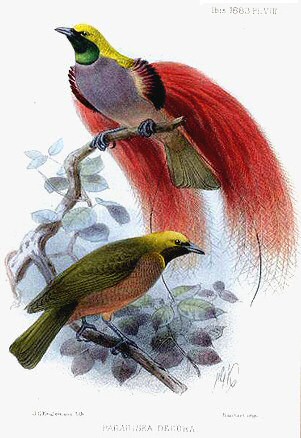
Sexual selection is a mechanism of evolution in which members of one biological sex choose mates of the other sex to mate with, and compete with members of the same sex for access to members of the opposite sex. These two forms of selection mean that some individuals have greater reproductive success than others within a population, for example because they are more attractive or prefer more attractive partners to produce offspring. Successful males benefit from frequent mating and monopolizing access to one or more fertile females. Females can maximise the return on the energy they invest in reproduction by selecting and mating with the best males.

On the Origin of Species is a work of scientific literature by Charles Darwin that is considered to be the foundation of evolutionary biology. It was published on 24 November 1859. Darwin's book introduced the scientific theory that populations evolve over the course of generations through a process of natural selection, although Lamarckism was also included as a mechanism of lesser importance. The book presented a body of evidence that the diversity of life arose by common descent through a branching pattern of evolution. Darwin included evidence that he had collected on the Beagle expedition in the 1830s and his subsequent findings from research, correspondence, and experimentation.
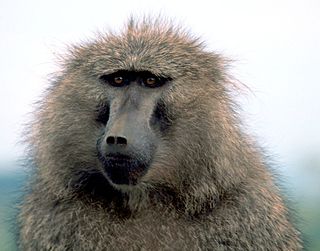
Primatology is the scientific study of non-human primates. It is a diverse discipline at the boundary between mammalogy and anthropology, and researchers can be found in academic departments of anatomy, anthropology, biology, medicine, psychology, veterinary sciences and zoology, as well as in animal sanctuaries, biomedical research facilities, museums and zoos. Primatologists study both living and extinct primates in their natural habitats and in laboratories by conducting field studies and experiments in order to understand aspects of their evolution and behavior.

Sarah Hrdy is an American anthropologist and primatologist who has made major contributions to evolutionary psychology and sociobiology. She is considered "a highly recognized pioneer in modernizing our understanding of the evolutionary basis of female behavior in both nonhuman and human primates". In 2013, Hrdy received a Lifetime Career Award for Distinguished Scientific Contribution from the Human Behavior and Evolution Society.

The Descent of Man, and Selection in Relation to Sex is a book by English naturalist Charles Darwin, first published in 1871, which applies evolutionary theory to human evolution, and details his theory of sexual selection, a form of biological adaptation distinct from, yet interconnected with, natural selection. Darwin used the word "descent" to mean lineal descendant of ancestors. The book discusses many related issues, including evolutionary psychology, evolutionary ethics, evolutionary musicology, differences between human races, differences between sexes, the dominant role of women in mate choice, and the relevance of the evolutionary theory to society.

George Christopher Williams was an American evolutionary biologist.

Antoinette Louisa Brown, later Antoinette Brown Blackwell, was the first woman to be ordained as a mainstream Protestant minister in the United States. She was a well-versed public speaker on the paramount issues of her time and distinguished herself from her contemporaries with her use of religious faith in her efforts to expand women's rights.

On Human Nature is a book by the biologist E. O. Wilson, in which the author attempts to explain human nature and society through sociobiology. Wilson argues that evolution has left its traces on characteristics such as generosity, self-sacrifice, worship and the use of sex for pleasure, and proposes a sociobiological explanation of homosexuality.
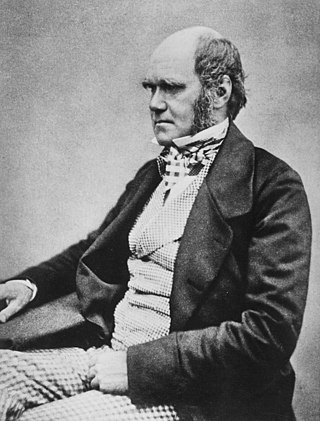
Charles Robert Darwin was an English naturalist, geologist, and biologist, widely known for his contributions to evolutionary biology. His proposition that all species of life have descended from a common ancestor is now generally accepted and considered a fundamental scientific concept. In a joint presentation with Alfred Russel Wallace, he introduced his scientific theory that this branching pattern of evolution resulted from a process he called natural selection, in which the struggle for existence has a similar effect to the artificial selection involved in selective breeding. Darwin has been described as one of the most influential figures in human history and was honoured by burial in Westminster Abbey.
Evolutionary psychology seeks to identify and understand human psychological traits that have evolved in much the same way as biological traits, through adaptation to environmental cues. Furthermore, it tends toward viewing the vast majority of psychological traits, certainly the most important ones, as the result of past adaptions, which has generated significant controversy and criticism from competing fields. These criticisms include disputes about the testability of evolutionary hypotheses, cognitive assumptions such as massive modularity, vagueness stemming from assumptions about the environment that leads to evolutionary adaptation, the importance of non-genetic and non-adaptive explanations, as well as political and ethical issues in the field itself.
A Natural History of Rape: Biological Bases of Sexual Coercion is a 2000 book by biologist Randy Thornhill and anthropologist Craig T. Palmer, in which the authors argue that evolutionary psychology can account for rape among human beings, maintain that rape is either a behavioral adaptation or a byproduct of adaptive traits such as sexual desire and aggressiveness, and make proposals for preventing rape. They also criticize the assumption that there is a connection between what is naturally selected and what is morally right or wrong, which they refer to as the "naturalistic fallacy", and the idea, popularized by the feminist author Susan Brownmiller in Against Our Will (1975), that rape is an expression of male domination and is not sexually motivated.
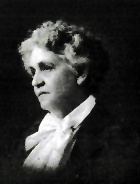
Eliza Burt Gamble (1841–1920) was an intellectual active in the 19th and early 20th centuries. She was an advocate of the Women's Movement, a mother, a writer, and a teacher from Michigan. Gamble's writings pioneered the use of evolutionary theory as a resource for making claims about women. Her work engaged with Charles Darwin's theory of sexual selection. Her work paid significant attention to the importance of gender in evolution.
Bateman's principle, in evolutionary biology, is that in most species, variability in reproductive success is greater in males than in females. It was first proposed by Angus John Bateman (1919–1996), an English geneticist. Bateman suggested that, since males are capable of producing millions of sperm cells with little effort, while females invest much higher levels of energy in order to nurture a relatively small number of eggs, the female plays a significantly larger role in their offspring's reproductive success. Bateman's paradigm thus views females as the limiting factor of parental investment, over which males will compete in order to copulate successfully.
Gender essentialism is a theory which attributes distinct, intrinsic qualities to women and men. Based in essentialism, it holds that there are certain universal, innate, biologically based features of gender that are at the root of many of the group differences observed in the behavior of men and women.
The origins of society — the evolutionary emergence of distinctively human social organization — is an important topic within evolutionary biology, anthropology, prehistory and palaeolithic archaeology. While little is known for certain, debates since Hobbes and Rousseau have returned again and again to the philosophical, moral and evolutionary questions posed.

The Evolution of Human Sexuality is a 1979 book about human sexuality by the anthropologist Donald Symons, in which the author discusses topics such as human sexual anatomy, ovulation, orgasm, homosexuality, sexual promiscuity, and rape, attempting to show how evolutionary concepts can be applied to humans. Symons argues that the female orgasm is not an adaptive trait and that women have the capacity for it only because orgasm is adaptive for men, and that differences between the sexual behavior of male and female homosexuals help to show underlying differences between male and female sexuality. In his view, homosexual men tend to be sexually promiscuous because of the tendency of men in general to desire sex with a large number of partners, a tendency that in heterosexual men is usually restrained by women's typical lack of interest in promiscuous sex. Symons also argues that rape can be explained in evolutionary terms and feminist claims that it is not sexually motivated are incorrect.
Amy Parish is a biological anthropologist, primatologist, and Darwinian feminist. She has taught at the University of Southern California in the Gender Studies and Anthropology departments since 1999. She is recognised as being a world leading expert in bonobo studies.